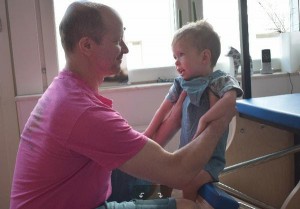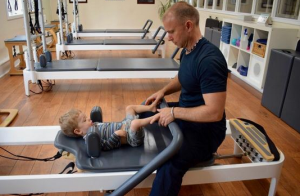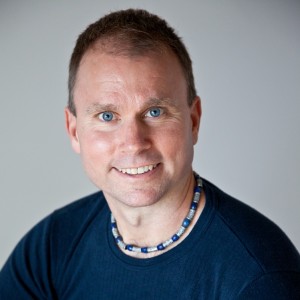September 19, 2018
Pilates for Prader-Willi Syndrome
by Joakim Valsinger

Prader-Willi Syndrome (PWS) is an unusual genetic disorder with a long list of characteristics that develop over time. One of these is hypotonia – poor muscle tone. Many other more common disorders also cause hypotonia. It’s possible that you will come across people with this condition in your own practice. I want to share my experience of how Pilates equipment and approaches have helped my son Alben.
Little Albie was born two months premature by emergency C-section; it was obvious from the beginning that there was something not right with our child. He had no muscular tone and would flop completely in two when lifted by his tiny waist. It took three weeks to get the PWS diagnosis.

Infants with Prader-Willi Syndrome often present with floppiness and a “failure to thrive”. They can’t suckle, can’t move, can’t cry; all of Abie’s needs had to administered according to the clock, not by his reactions.
I have seen Pilates help many people become a better version of themselves since I first encountered it 25 years ago. As an instructor, I have had to rearrange, modify and deconstruct Pilates exercises to help all sorts of clients through the issues they have presented me with over the years. Once I learned more about Albie’s condition and how he will be affected through his life, I saw my professional skills as a good partner to my paternal instincts. I have tried to use Pilates techniques and philosophy to allow Albie to overcome the immense hurdles he has already faced. With the success we have noted from this approach thus far, I am sure that we will be able to build on this groundwork and help him develop even further.
Albie cannot achieve any obvious Pilates “textbook” exercises, but neither can many of my clients affected by Parkinson’s, missing limbs, paralysis or any of the myriad of greater and smaller conditions people bring to the Pilates Studio. However, just like them, he benefits from a systematic approach to moving each joint in an appropriate range, building coordination, stamina and strength and taking him closer to (as normal as possible) whole-body health.
Breath
Joseph Pilates made a great deal of breath being the first and last acts of life. Initially, Albie struggled to breathe on his own. Gravity and the weight of his own ribcage prevented him from inhaling.
Since he was initially discharged from hospital, Albie has made many return visits, usually for bouts of chest infection, long after the age that children usually suffer from bronchiolitis. Due to his hypotonia, he does not have an effective cough, making it almost impossible for him to clear his throat of mucous. A common cold often requires days of hospitalization for him because of mucous buildup in his airways. By strengthening his core through Pilates, we have been able to improve Albie’s posture, relieve pressure on his lungs, open up his airways and allow him to breathe more effectively.
Gaze
When Albie was about 3 months old, I was concerned that he might have a visual impairment as he did not track objects or faces with his eyes. As eye movement is governed by muscles, this seemed likely. However, we were assured that he had no visual impairments, so I persevered with moving my face above him. Slowly, he found strength to follow my movements with his beautiful blue eyes.
As Lolita San Miguel says, “Where the eyes go, the head goes, and where the head goes the spine follows”. Once I was sure that he could track me, I started challenging him by gradually moving further to each side, forcing his gaze to follow me by turning his head. At first he did this lying supine, later by laying him into the well of the Spine Corrector. The slight incline placed more vertical stress on his neck; an early drill for getting his head under control.
Poor Thermoregulation and the benefits of the slow workout
PWS affects the capacity to control one’s body temperature. A real benefit of Pilates is that Albie doesn’t need to raise his core temperature as he trains his neurological connections.
The Chair

Gravity is an unforgiving force for a child whose low muscle tone makes it impossible to lift their own limbs, torso or head. Springs give a really nice feedback and gentle resistance to the hypotonic child. The proportions of the chair made it perfect for our earliest attempts at combining gravity with springs.
Putting Albie on the front edge of the Chair allowed us to attempt Footwork. With his torso fixed in place, the proportions and angles let him kick out with his legs and find an effective resistance on a low spring setting. I have never allowed a client to make quite such a racket on my apparatus!
A new exercise has arisen by suspending Albie by the armpits and letting his bum rest on the pedal. From here, he’s able to articulate his spine and push his pelvis up and down against the springs. It is a lovely way to work his core in a dynamic wave for his spine.
Reformer

Moving the infinity bar on the Allegro II halfway up the frame allows me to sit at the foot end of the carriage and help him do his Footwork. This facility is also great for seating him against one of the shoulder rests allows him to practice arm presses against a load which is less than gravity, without dragging his head down like the Quadruped position does. Sitting Albie sideways on the Reformer carriage, we can challenge his lateral balance by pinning his hips down and sliding him gently side to side on a yellow or blue spring.
Cadillac
By suspending the trapeze on long Exo Chair bungees under the canopy, I have been able to make a semi-supportive sling to aid Albie’s crawling. Crawling is a vital developmental stage to set the foundation for his walking, running, eating, and talking (and maybe even riding a bike if we’re lucky!). It’s especially important for a child with learning difficulties to encourage the right sequence of movement learning.
Pilates Everyday
Everyday play is infused with Pilates. Toys are placed around Albie to make him reach and twist for them. We aim to balance out his two sides by adding proprioceptive movements as much as possible. At mealtimes, Albie only has eyes for his big sister, Mariella. To prevent this one-way rotation turning into a scoliosis, we swap their chairs every Sunday. This way he spends a week looking left and a week looking right.
Inspiration
While playing with toys, Albie often trains his body so hard that he doesn’t have the strength to hold his own head up and collapses to the floor. Yet when you look at his little face, he is lying there smiling; after half a minute or so, he is straining to get himself back up again to continue. Even when he feels so worked that tears come out, he quickly recovers morale and cracks on with the task at hand. I am truly inspired to be able to help him on his journey.
In my twenties, I undertook the Australian Army Commando Selection Course. This is a Special Forces Unit whose selection process is second only in difficulty to the Australian SAS selection course. During that two-year period, I was surrounded by some of the toughest men I have ever seen. And yet, never have I met any person with the same tenacity that Albie displays on a daily basis.
At 18 months, Albie is doing well. He improves weekly, brings joy to his family and, most importantly, he loves life. Pilates has been a wonderful way to bond with him, to feel that I can give him some worthwhile help, and to cope with the mental change needed when faced with a future as a special needs family.
We have had such positive support from family and our wonderful team of medical specialists. The Pilates Method, its community, and Albie’s unrivalled determination means that we should see him improve from here. It’s new territory, but I’m truly convinced he has a chance to write his own future.
Cadillac
By suspending the trapeze on long Exo Chair bungees under the canopy, I have been able to make a semi-supportive sling to aid Albie’s crawling. Crawling is a vital developmental stage to set the foundation for his walking, running, eating, and talking (and maybe even riding a bike if we’re lucky!). It’s especially important for a child with learning difficulties to encourage the right sequence of movement learning.
Pilates Everyday
Everyday play is infused with Pilates. Toys are placed around Albie to make him reach and twist for them. We aim to balance out his two sides by adding proprioceptive movements as much as possible. At mealtimes, Albie only has eyes for his big sister, Mariella. To prevent this one-way rotation turning into a scoliosis, we swap their chairs every Sunday. This way he spends a week looking left and a week looking right.
Inspiration
While playing with toys, Albie often trains his body so hard that he doesn’t have the strength to hold his own head up and collapses to the floor. Yet when you look at his little face, he is lying there smiling; after half a minute or so, he is straining to get himself back up again to continue. Even when he feels so worked that tears come out, he quickly recovers morale and cracks on with the task at hand. I am truly inspired to be able to help him on his journey.
In my twenties, I undertook the Australian Army Commando Selection Course. This is a Special Forces Unit whose selection process is second only in difficulty to the Australian SAS selection course. During that two-year period, I was surrounded by some of the toughest men I have ever seen. And yet, never have I met any person with the same tenacity that Albie displays on a daily basis.
At 18 months, Albie is doing well. He improves weekly, brings joy to his family and, most importantly, he loves life. Pilates has been a wonderful way to bond with him, to feel that I can give him some worthwhile help, and to cope with the mental change needed when faced with a future as a special needs family.
We have had such positive support from family and our wonderful team of medical specialists. The Pilates Method, its community, and Albie’s unrivalled determination means that we should see him improve from here. It’s new territory, but I’m truly convinced he has a chance to write his own future.

 Joakim Valsinger is an Award Winning Fitness Instructor and a Lolita San Miguel disciple having graduated from her Pilates Master Mentor Program in 2015. He is the founder of Bälans Pilates Studio and Treatment Rooms in Perth, Scotland where he lives with his wife and two children. Joakim was the first person in the United Kingdom to become an Educator for Lolita’s Legacy, Comprehensive Pilates Teacher Training.
Joakim Valsinger is an Award Winning Fitness Instructor and a Lolita San Miguel disciple having graduated from her Pilates Master Mentor Program in 2015. He is the founder of Bälans Pilates Studio and Treatment Rooms in Perth, Scotland where he lives with his wife and two children. Joakim was the first person in the United Kingdom to become an Educator for Lolita’s Legacy, Comprehensive Pilates Teacher Training.
In 2014 Joakim received a UK wide Fitness Industry Award, the Spirit of Flame, in recognition for going the extra mile in getting more people exercising more often.
Joakim Trained as a Pilates Instructor with the Pilates Foundation, before joining Body Control Pilates in 2004. He also has a Level 4 Lower Back Pain Specialist accreditation with REPs, the Register of Exercise Professionals.
A Swedish born Australian, Joakim came to the UK in 1998. He is a former Australian Army Reserve SF Commando, Bondi Beach Surf Life Saver and Territorial Army Physical Training Instructor. A Military background is relatively unusual in the Pilates industry and Joakim manages to combine the physical and mental fitness techniques used in the Military with the mind-body awareness and sensitivity that can be found in the Pilates Method. Many of the techniques and strategies used in training of Military personnel are very useful in the setting of a Pilates Studio and Joakim hopes to share as much as he can from his experiences and observations.
Joakim makes regular trips overseas as a Fitness Instructor, presenter and guest Pilates Instructor. He has lead the ‘Exercise Active Archipelago’ a challenging Boot Camp style fitness series on a remote island in Sweden, and taught at SunFit, a fitness retreat for British Military Fitness.
In 2017 Joakim returns to teach at AzulFit, a beautiful Pilates & Yoga Retreat, also on Fuerte Ventura and he will be presenting Pilates for the Military at the International Pilates Heritage Congress in Joseph Pilates’ birthplace – Mönchengladbach. Later in the year he is presenting at the Pilates International Conference PIC in Curitiba, Brazil.

